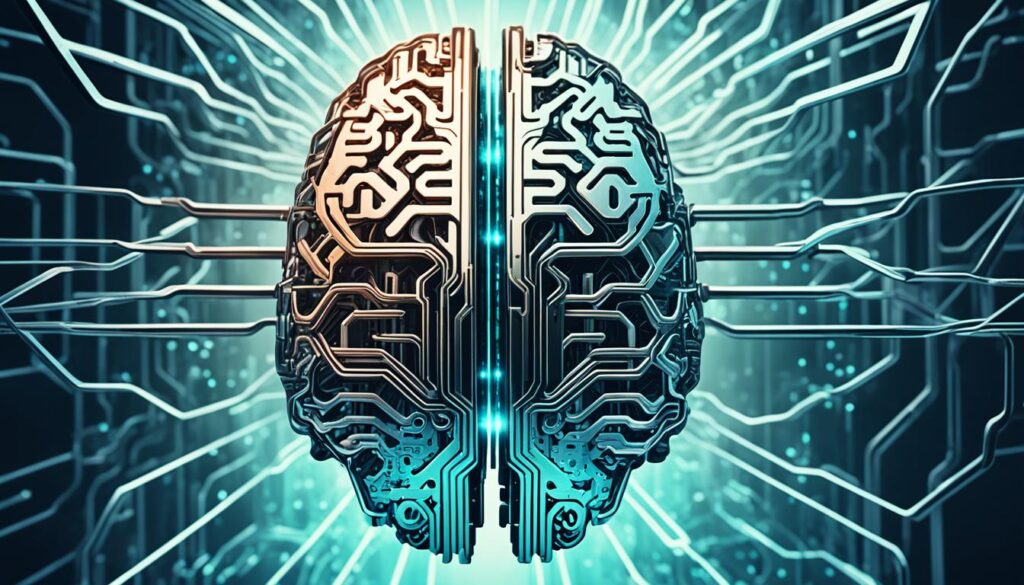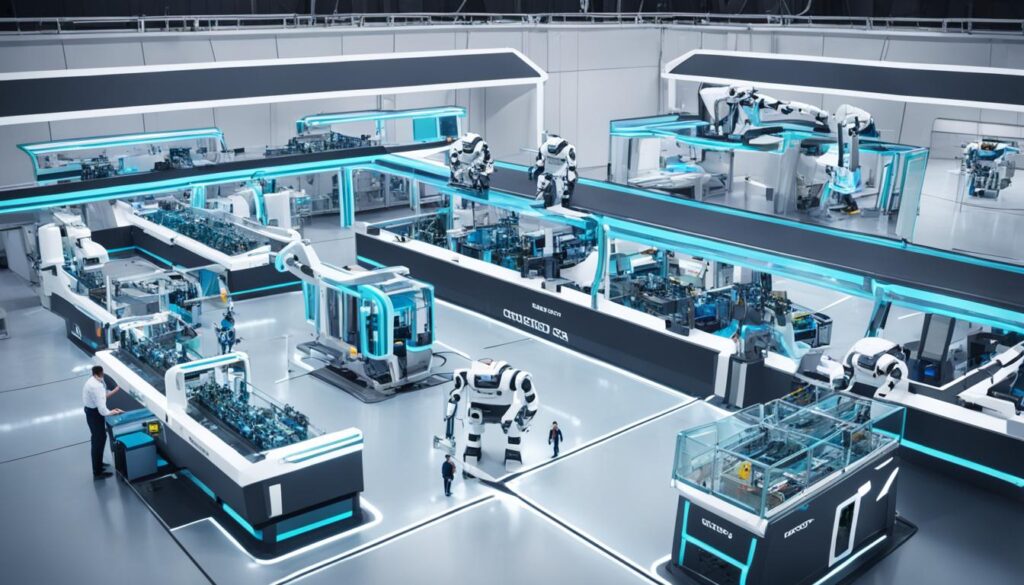Imagine a world where machines can learn and adapt, solving complex problems with ease. This is the promise of artificial intelligence (AI), a technology changing every industry and part of our lives. AI is making new discoveries and changing what we thought was possible in healthcare, finance, national security, and entertainment.
At the start of a new tech era, understanding AI’s importance is key. It helps us change how we use information, analyze data, and make choices. This leads to more innovation, productivity, and growth. In fact, experts believe AI could boost the global economy by $15.7 trillion by 2030.
But many don’t know much about AI’s abilities and effects. This article will explore AI, its types, how it changes industries, and the ethical issues it raises. Let’s dive into the world of AI and see how it’s shaping our future.
Key Takeaways
- Artificial intelligence is a powerful tool that enables us to rethink how we integrate information, analyze data, and make decisions.
- AI has the potential to increase global GDP by $15.7 trillion by 2030, making it a critical driver of economic growth and innovation.
- AI is transforming industries, from healthcare and finance to national security and entertainment, unlocking new frontiers and redefining what’s possible.
- Understanding the significance of AI and its applications is crucial as the technology continues to advance and integrate into our daily lives.
- Ethical considerations, such as algorithmic bias and data privacy, must be addressed as AI becomes more prevalent in decision-making processes.
What is Artificial Intelligence?
Artificial intelligence (AI) is a fast-growing field that lets machines think and act like humans. It uses advanced algorithms and lots of data to solve complex problems. AI aims to make machines smarter and more flexible, just like humans.
Narrow AI and General AI
There are two main types of AI: narrow AI and general AI. Narrow AI, or “weak” AI, is great at doing one specific job, like predicting the weather or helping with daily tasks. On the other hand, general AI, or “strong” AI, wants to be as smart and adaptable as humans across many areas.
Machine Learning and Deep Learning
Machine learning is a big part of AI that lets systems get better over time by learning from data. It’s behind big advances in understanding language, recognizing images, and predicting the future. Deep learning is a special kind of machine learning that uses complex neural networks to do things like recognize speech and drive cars on their own.
| AI Discipline | Key Characteristics | Notable Applications |
|---|---|---|
| Narrow AI | Designed for specific, well-defined tasks | Digital assistants, recommendation systems, image classification |
| General AI | Emulates human-level intelligence and adaptability | Still largely theoretical, with ongoing research and development |
| Machine Learning | Algorithms that learn from data to improve performance | Predictive analytics, fraud detection, personalized recommendations |
| Deep Learning | Advanced machine learning using artificial neural networks | Natural language processing, computer vision, speech recognition |
By using narrow AI, general AI, machine learning, and deep learning, AI is changing many industries and pushing what humans can do. As AI grows, its potential to change our world is both thrilling and makes us think deeply.

Significance of AI in Today’s World
Artificial intelligence (AI) is now a key part of business growth and change. It helps automate tasks, making processes faster and more efficient. This can save companies up to 70% of their time.
Source of Business Value
AI helps businesses by making processes smoother, improving decisions, and sparking new ideas. In the US, investments in financial AI jumped to $12.2 billion between 2013 and 2014. Companies wanted to use AI to stay ahead in the market.
Agility and Competitive Advantage
AI also brings agility and a competitive edge by helping companies quickly adapt and innovate. In fact, most top executives believe scaling AI is crucial to stay competitive. If they don’t, they risk being left behind.
| Metric | Value |
|---|---|
| Only 17% of senior business leaders in the United States were familiar with artificial intelligence in 2017 | 17% |
| Artificial intelligence technologies could increase global GDP by $15.7 trillion by 2030 | $15.7 trillion |
| Chinese AI-led automation could boost GDP growth by 0.8 to 1.4 percentage points annually | 0.8 to 1.4 percentage points |
| China aimed to invest $150 billion in AI to become a global leader by 2030 | $150 billion |

These numbers show how vital the business value of ai, ai competitive advantage, and ai adoption are for success today. They highlight the importance of making the most out of AI.
Importance of Artificial Intelligence
Artificial intelligence (AI) is changing our world fast. It’s making businesses run better and helping in healthcare. The benefits of AI are huge, making it a key part of the ai transformation we see.
AI is making companies work more smoothly. It cuts costs by reducing waste and making better use of resources. Plus, it helps people make smarter choices by predicting patterns and analyzing data.
AI is also changing healthcare for the better. It can spot breast cancer early and help with surgeries on its own. These changes are making patients safer and improving their care.
| AI Advantages | Impact |
|---|---|
| Improved Efficiency | Up to 54% annual growth in the global AI market (Statista) |
| Enhanced Accuracy | AI-powered robotic surgery systems reducing human error |
| Competitive Advantage | AI-enabled informed decision-making and predictive analytics |
| Automation of Monotonous Tasks | AI chatbots and voice assistants enhancing customer service |
AI is more than just a tool; it’s opening up new chances for businesses and people. It helps workers do more and makes customers happier. As AI keeps evolving, we’ll see even more changes that will shape our future.
“AI is not just the future – it’s the present. The ai transformation is happening now, and those who embrace it will reap the rewards.”
Applications of AI across Industries
Artificial Intelligence (AI) is changing the game in many fields, from finance to healthcare. The global AI market is set to hit $1,811.8 billion by 2030, up from $136.6 billion in 2022. This growth shows how businesses are quickly adopting AI’s powerful technology.
Finance and Banking
AI is a big deal in finance. Banks use it to spot fraud, trade stocks, and manage investments. AI looks through lots of financial data to find suspicious activities. This helps stop fraud and cybercrime.
AI also helps with trading by making quick decisions. These decisions can improve investment strategies and increase returns.
National Security and Defense
The military and security agencies are using AI too. They analyze data from drones and other sources with AI. This helps them make faster, smarter decisions.
AI can quickly go through a lot of information. This makes defense and security operations more efficient.
Healthcare and Medical Field
In healthcare, AI is making a big impact. It uses advanced techniques like deep learning to improve diagnosis and treatment. AI looks at medical images and patient data to find patterns and predict health outcomes.
This leads to more tailored care. AI also helps find new drugs and make medical records easier to manage. This improves patient care and makes healthcare more efficient.
AI’s use across industries shows its huge potential. As companies invest in AI, we’ll see more new solutions. These solutions will drive innovation, make things more efficient, and give businesses an edge.
| Industry | AI Applications |
|---|---|
| Finance and Banking |
|
| National Security and Defense |
|
| Healthcare and Medical Field |
|
Challenges and Ethical Considerations
AI is becoming more common in many industries, but we face big ethical challenges. Issues like algorithmic bias, data privacy, and security are key concerns. We need to use AI responsibly to gain trust and move forward with confidence.
Algorithmic Bias and Discrimination
AI’s fairness depends on the data it learns from. If the data has biases, so will the AI. Studies have found bias in facial recognition and hiring algorithms. This shows we must test AI carefully to make sure it treats everyone fairly.
Researchers are working on explainable AI to make AI more transparent and accountable. This is important in areas like healthcare and self-driving cars.
Data Privacy and Security
AI also raises big concerns about privacy and security. There’s a risk of unauthorized access and misuse of AI tools like facial recognition. Privacy and bias in AI are major ethical issues. We need strong rules and data protection to use AI right.
As we explore AI’s benefits, keeping the public’s trust is crucial. We must focus on transparency, accountability, and ethical development. This way, AI can lead to innovation and make a positive change in society.
“The White House recently invested $140 million in funding related to AI, showing a significant commitment to the advancement of artificial intelligence.”
Conclusion
Artificial intelligence is now a key part of our world, changing how we live. The growth of AI is fueled by more data and advances in cloud computing. It’s crucial to grasp its value and work to bring AI into our businesses.
To make the most of AI, we need to set clear business goals, adjust our workforces, and create strong rules and ethical standards. This way, we can fully benefit from AI and stay ahead in the future. The future looks bright for AI, but we must tackle the big challenges it brings to make sure it’s used right.
We should keep investing in AI research and work with lawmakers to handle ethical issues. Teaching the next generation about AI’s impact is also vital. By following AI trends and having a solid AI plan, we can thrive in the digital era. This will let us use AI’s power for good in our society.



